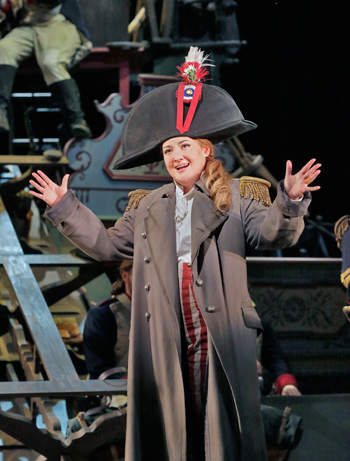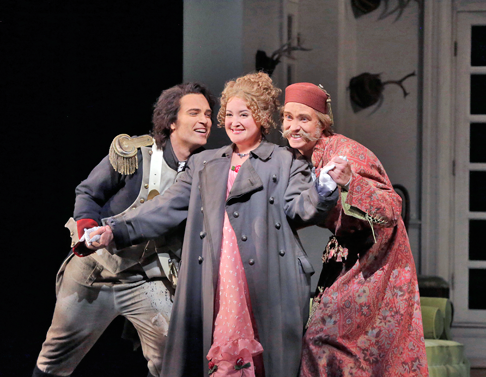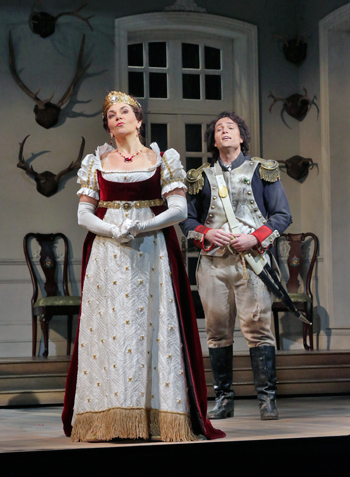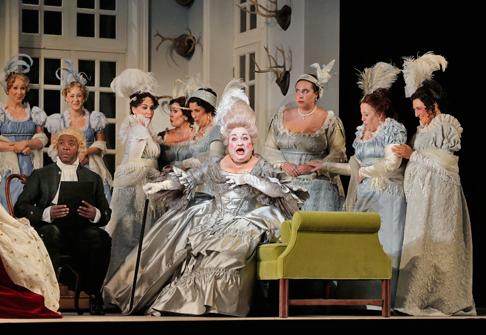
30 Aug 2015
Regimented Daughter in Santa Fe
At Santa Fe Opera, Donizetti’s effervescent The Daughter of the Regiment can’t quite decide what it wants to be when it grows up.
English Touring Opera are delighted to announce a season of lyric monodramas to tour nationally from October to December. The season features music for solo singer and piano by Argento, Britten, Tippett and Shostakovich with a bold and inventive approach to making opera during social distancing.
This tenth of ten Live from London concerts was in fact a recorded live performance from California. It was no less enjoyable for that, and it was also uplifting to learn that this wasn’t in fact the ‘last’ LfL event that we will be able to enjoy, courtesy of VOCES8 and their fellow vocal ensembles (more below …).
Ever since Wigmore Hall announced their superb series of autumn concerts, all streamed live and available free of charge, I’d been looking forward to this song recital by Ian Bostridge and Imogen Cooper.
Although Stile Antico’s programme article for their Live from London recital introduced their selection from the many treasures of the English Renaissance in the context of the theological debates and upheavals of the Tudor and Elizabethan years, their performance was more evocative of private chamber music than of public liturgy.
Evidently, face masks don’t stifle appreciative “Bravo!”s. And, reducing audience numbers doesn’t lower the volume of such acclamations. For, the audience at Wigmore Hall gave soprano Elizabeth Llewellyn and pianist Simon Lepper a greatly deserved warm reception and hearty response following this lunchtime recital of late-Romantic song.
For this week’s Live from London vocal recital we moved from the home of VOCES8, St Anne and St Agnes in the City of London, to Kings Place, where The Sixteen - who have been associate artists at the venue for some time - presented a programme of music and words bound together by the theme of ‘reflection’.
'Such is your divine Disposation that both you excellently understand, and royally entertaine the Exercise of Musicke.’
‘And there was war in heaven: Michael and his angels fought against the dragon; and the dragon fought and his angels, And prevailed not; neither was their place found any more in heaven … that old serpent … Satan, which deceiveth the whole world: he was cast out into the earth, and his angels were cast out with him.’
There was never any doubt that the fifth of the twelve Met Stars Live in Concert broadcasts was going to be a palpably intense and vivid event, as well as a musically stunning and theatrically enervating experience.
‘Love’ was the theme for this Live from London performance by Apollo5. Given the complexity and diversity of that human emotion, and Apollo5’s reputation for versatility and diverse repertoire, ranging from Renaissance choral music to jazz, from contemporary classical works to popular song, it was no surprise that their programme spanned 500 years and several musical styles.
The Academy of St Martin in the Fields have titled their autumn series of eight concerts - which are taking place at 5pm and 7.30pm on two Saturdays each month at their home venue in Trafalgar Square, and being filmed for streaming the following Thursday - ‘re:connect’.
The London Symphony Orchestra opened their Autumn 2020 season with a homage to Oliver Knussen, who died at the age of 66 in July 2018. The programme traced a national musical lineage through the twentieth century, from Britten to Knussen, on to Mark-Anthony Turnage, and entwining the LSO and Rattle too.
With the Live from London digital vocal festival entering the second half of the series, the festival’s host, VOCES8, returned to their home at St Annes and St Agnes in the City of London to present a sequence of ‘Choral Dances’ - vocal music inspired by dance, embracing diverse genres from the Renaissance madrigal to swing jazz.
Just a few unison string wriggles from the opening of Mozart’s overture to Le nozze di Figaro are enough to make any opera-lover perch on the edge of their seat, in excited anticipation of the drama in music to come, so there could be no other curtain-raiser for this Gala Concert at the Royal Opera House, the latest instalment from ‘their House’ to ‘our houses’.
"Before the ending of the day, creator of all things, we pray that, with your accustomed mercy, you may watch over us."
The doors at The Metropolitan Opera will not open to live audiences until 2021 at the earliest, and the likelihood of normal operatic life resuming in cities around the world looks but a distant dream at present. But, while we may not be invited from our homes into the opera house for some time yet, with its free daily screenings of past productions and its pay-per-view Met Stars Live in Concert series, the Met continues to bring opera into our homes.
Music-making at this year’s Grange Festival Opera may have fallen silent in June and July, but the country house and extensive grounds of The Grange provided an ideal setting for a weekend of twelve specially conceived ‘promenade’ performances encompassing music and dance.
There’s a “slide of harmony” and “all the bones leave your body at that moment and you collapse to the floor, it’s so extraordinary.”
“Music for a while, shall all your cares beguile.”
The hum of bees rising from myriad scented blooms; gentle strains of birdsong; the cheerful chatter of picnickers beside a still lake; decorous thwacks of leather on willow; song and music floating through the warm evening air.

At Santa Fe Opera, Donizetti’s effervescent The Daughter of the Regiment can’t quite decide what it wants to be when it grows up.
After a sparkling, infectious overture, expertly led by Speranza Scappucci, a Les Miz style barricade rotates to reveal the choristers, not in colorful folk costumes, but in severely styled black funeral wear (think: Amish look).
Belying the set-up of the sprightly overture, director Ned Canty got things off to a rather somber start, more William Tell than Donizetti’s comic opus. After this stolid beginning, Mr. Canty seemed to have second thoughts, and in short order the tale gets liberally peppered with the usual (and some unusual) shameless jokes and inspired (and some uninspired) physical comedic schtick, and then some. Canty wrote the English dialogue with the music sung in the original French.
Allen Moyer’s sets and costumes were quite witty and adaptable. The barricade of Act I yields furniture and props that cleverly get plucked off the pile, and there are ample levels to create interesting stage pictures. The ornate false proscenium, hunter green with panels painted with Tyrolean scenes, created a sense of place and established a highly theatrical style. A stylish carriage conveys the Marquise on- and off-stage. The Berkenfeld manse of Act II is sumptuous inside and out, its exterior paraphrasing Linderhof. Rick Fisher’s efficient lighting design was up to his usual high standard.
After the drab opening attire, Mr. Moyer’s costumes add color little by little, first with red and blue uniform jackets, then with Tonio’s red and black Trachten, later with lavish party gowns. Marie’s over-the-top pink dress for the Lesson Scene was a riot of invention and that scene crackled with good humor. And then the director seemed to change his mind again with the mood becoming soul-searching, earnest, and well, a bit ponderous. By the time he changed his mind yet again with the interpolated and extraneous announcement of silly German names and titles of all of the party guests, the Duchess of Krakenthorp was thoroughly pre-empted and upstaged.
 Alek Shrader as Tonio, Anna Christy as Marie and Kevin Burdette as Sulpice-Pingot
Alek Shrader as Tonio, Anna Christy as Marie and Kevin Burdette as Sulpice-Pingot
By that point, the return to frivolity was too little too late. Self-indulgence marred Act II with too many lilies being gilded with too much “added material,” too much deference to the (secondary character) Marquise’s “feelings,” and too little regard for pacing in what is, after all, a pretty slight comedy. By removing non-essential business, tightening the repetitious dialogue, keeping the focus on Marie-Tonio, and urging the pace along, about ten minutes could be taken off the second act and the show would be even better than the audience already thinks it is.
Whatever the (only) occasional longueurs of the staging, Maestra Scappucci snapped the proceedings back into focus every time her authoritative baton came down, eliciting a reading of the score that was characterized by audacious spontaneity, effervescence and a keen sense of style. The conductor not only admirably partnered her singers with breadth and flexibility on poignant arias, but also took firm control over such tricky allegro passages as that breathless account of the Act II trio Tous les trois réunis. Clearly, the talented Speranza Scappucci is a podium star on the rise.
A lot is asked of the four principles in carrying The Daughter on their backs, and they did not disappoint. The great Beverly Sills once described the vivandière Marie as “Lucille Ball with high notes.” Just as we all loved Lucy, we were enchanted by pretty, perky and petite Anna Christy who proved a natural as the canteen girl, a supposed orphan who has been “adopted” by the 21st Regiment.
Ms. Christy takes the stage as an unapologetic tomboy and shows off awesome comic timing. Adding to the appeal, she also has a finely spun, meticulously schooled, silvery soprano of great agility and admirable range. While she offers sparkling vocalizing throughout the evening, it is in the slower arias that she finds the most personalized tone and most engaging pathos. If I had one wish for Anna, it might be to eliminate a few of the held notes in alt. The couple of thrilling successes were offset by a few that wanted to splay. When you are as accomplished as this, when we are already eating out of your hand, when we wouldn’t miss the additional stratospheric notes, why take chances? That minor quibble aside, Anna Christy is giving a wholly accomplished star performance.
 Phyllis Pancella as the Marquise of Berkenfeld and Alek Shrader as Tonio
Phyllis Pancella as the Marquise of Berkenfeld and Alek Shrader as Tonio
Alek Shrader is easily the funniest Tonio of my experience. From his first entrance, picture postcard handsome in his Tyrolean get-up, he immediately betrays a puppy dog eagerness and gangliness that is consistently appealing. His physical comedy was superb. When he tried to be Joe Cool, listening to Marie’s story, he kept feigning casual positions that were impossible to maintain, with one of these finding him clinging to the barricade and dangling like a dyspeptic monkey.
Mr. Shrader’s singing was assured and correct, although the tone has taken on a slightly veiled quality since last I heard him. He has a fine sense of legato, to be sure, and he injects personality and purpose into all he sings. The very top notes thin out a mite these days, and while he certainly had the goods for “Mes amis,” he lacked that final ounce of real distinction. Like his co-star, he scored decisively in such touching moments as Pour me rapprocher de Marie, in which his beautiful instrument, comfortable tessitura, and heartfelt intent magically merged.
As Sergeant Sulpice, it was hard to believe that Kevin Burdette was the same performer who was so serious and compelling in Cold Mountain some days prior. Here, he was all loose limbs and German-challenged orator, a marriage of Dick Van Dyke and Mr. Magoo. Forget about solar panels, Mr. Burdette generates enough energy to power greater Santa Fe. That he also sang with a direct, polished delivery was icing on the pratfall.
Far from the usual dotty Marquise de Berkenfeld, Phyllis Pancella offered a glamorous and elegant interpretation. If her ripe mezzo has gained a more mature sheen over the years, she remains a very gifted singer. Her craft is on full display as she deftly utilizes a change of registers to underscore comic shifts in her musical lines. Moreover, she proved herself once again to be a fine comedienne, delivering her lines with an endearing self-importance, while mugging with a vaudevillian’s understated expertise.
 Judith Christin as the Duchess of Krakenthorp
Judith Christin as the Duchess of Krakenthorp
The accomplished singer Judith Christin seemed wasted as the Duchess of Krakenthorp. Heavily made up in clown white greasepaint and overstated features, got up in an over-the-top silvery-white gown, and topped with an ostentatious wig, when Ms. Christin spoke in her distinctive contralto and rasped an exhortation with a heavy German accent, she could have been a man in drag. She did all that was asked of her with conviction to be sure, but I for one wish more had been asked.
Apprentice Calvin Griffin offered an imposing, handsome presence and sang with an assured bass-baritone as the servant Hortensius. Susanne Sheston had the chorus singing with gusto and personality. Seán Curran crafted some delightful, natural choreography, especially the Regiment’s fist pounding “salute” that delectably recalled the hand jive.
All in all, this Daughter had quite a successful romp across the SFO stage, but when she got too regimented and moody I just wish someone had told her to lighten back up.
James Sohre
Cast and production information:
Hortensius: Calvin Griffin; Marquise of Berkenfeld: Phyllis Pancella; Peasant: Jack Swanson; Sergeant Sulpice Pingot: Kevin Burdette; Marie: Anna Christy; Tonio: Alek Shrader; Corporal: Adrian Smith; Duchess of Krakenthorp: Judith Christin; Notary: Jorell Williams; Conductor: Speranza Scappucci; Director: Ned Canty; Set and Costume Design: Allen Moyer; Lighting Design: Rick Fisher; Choreographer: Seán Curran; Chorus Master: Susanne Sheston; English Dialogue: Ned Canty.